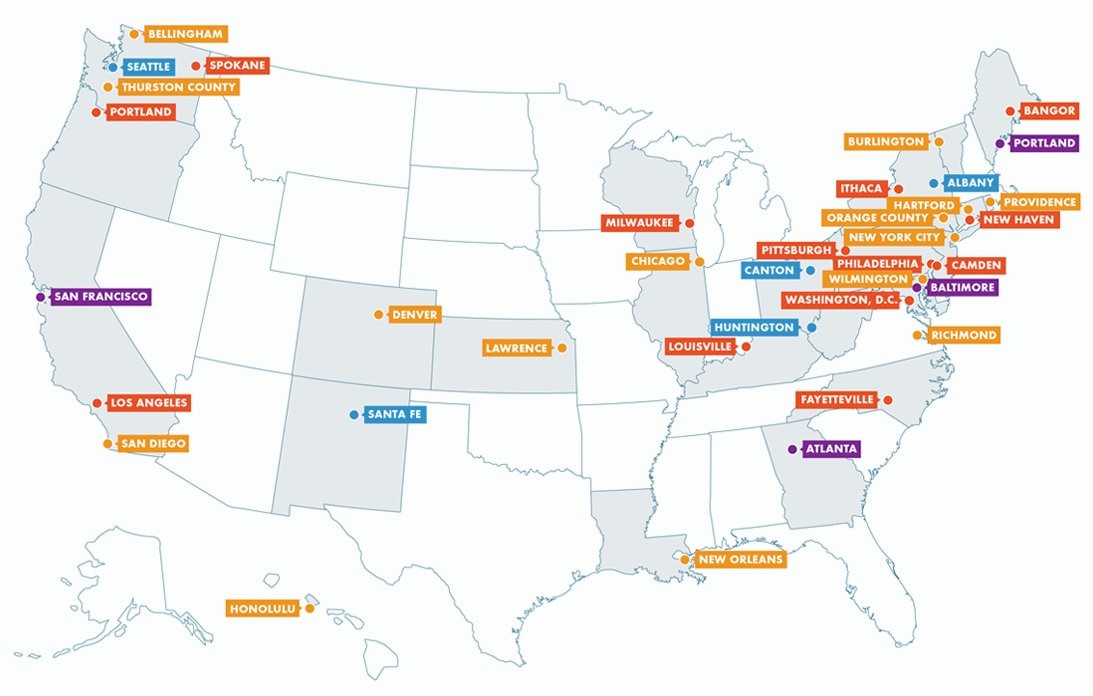Law Enforcement Assisted Diversion

| CASE MANAGEMENT | POLICING ROLE | LEAD IMPLEMENTATION | PROSECUTORS ROLE | COMMUNITY ROLE |
Law Enforcement Assisted Diversion (LEAD) is a pre-booking diversion pilot program that was originally developed in 2011 with the community to address low-level drug and prostitution crimes in the Belltown neighborhood in Seattle and the Skyway area of unincorporated King County. The program allows law enforcement officers to redirect low-level offenders engaged in drug or prostitution activity to community-based services, instead of jail and prosecution. By diverting eligible individuals to services, LEAD is committed to improving public safety and public order, and reducing the criminal behavior of people who participate in the program.
Since its inception, the program has proved to be cost effective with a cuurent expense of 532 per person per month and has impacted criminal statistics.
Based in Seattle, with offices in New York and Hartford, the Bureau is a partnership between the Public Defender Association and the Katal Center for Health, Equity, and Justice. The Bureau is led and staffed by members of a team of public health and justice system veterans who designed the original Seattle LEAD® program, and others who have now launched LEAD® in other jurisdictions. The Bureau also draws on the expertise of prosecutors, police, case managers and community public safety leaders who are now using LEAD® on the ground, and are willing to share lessons learned with their peers around the country.
In a LEAD® program, police officers exercise discretionary authority at point of contact to divert individuals to a community-based, harm-reduction intervention for law violations driven by unmet behavioral health needs. In lieu of the normal criminal justice system cycle -- booking, detention, prosecution, conviction, incarceration -- individuals are instead referred into a trauma-informed intensive case-management program where the individual receives a wide range of support services, often including transitional and permanent housing and/or drug treatment. Prosecutors and police officers work closely with case managers to ensure that all contacts with LEAD® participants going forward, including new criminal prosecutions for other offenses, are coordinated with the service plan for the participant to maximize the opportunity to achieve behavioral change.
LEAD® holds considerable promise as a way for law enforcement and prosecutors to help communities respond to public order issues stemming from unaddressed public health and human services needs -- addiction, untreated mental illness, homelessness, and extreme poverty -- through a public health framework that reduces reliance on the formal criminal justice system.
LEAD OBJECTIVES
|
1. Reorient the relationship between law enforcement and the community
|
2. Improve funding for alternative interventions by capturing and reinvesting criminal justice system savings |
3. Reduce racial disparities at the front-end of the criminal justice system |
4. Undo the number of people entering the criminal justice system for low-level offenses related to drug use, mental health, sex work, and extreme poverty |
5. Sustain public safety and public health through research-based, health-oriented and harm reduction interventions |
6. Strengthen government’s response to safety, disorder, and health-related problems |

|
Exploring |
In Development |
Final Stages |
Launched |
|
CA San Diego CO Denver CT Hartford DE Wilmington HI Honolulu IL Chicago (Cook County) KS Lawrence LA New Orleans NY NYC NY Orange County RI Providence VA Richmond VT Burlington WA Bellingham WA Thurston County |
CA Los Angeles CT New Haven D.C. Washington KY Louisville ME Bangor NC Fayetteville NJ Camden NY Ithaca OR Portland PA Philadelphia PA Pittsburgh WA Spokane WI Milwaukee |
MD Baltimore ME Portland CA San Francisco GA Atlanta (DeKalb & Fulton County) |
WA Seattle NM Santa Fe NY Albany WV Huntington OH Canton |
|
Seattle: 206.392.0050 x795 New York: 347.961.8071 |
NEW YORK, NY 201 Varick Street Front 1, #11 New York, NY 10014 |
HARTFORD, CT 150 Trumbull Street 4th Floor Hartford, CT 06103 |
SEATTLE, WA 810 Third Avenue Suite 705 Seattle, WA 98104 |








